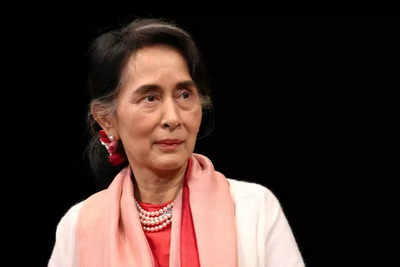[ad_1]

File photo: Aung San Suu Kyi
BANGKOK: Myanmar‘s deposed civilian leader Aung San Suu Kyi completed a third month under military-ordered house arrest Saturday — a period marked by scatter-gun criminal charges and apparent isolation from the chaos engulfing the country.
The nation has been plunged into violence since the military deposed the Nobel laureate in a February 1 coup, ending Myanmar’s brief tryst with democracy.
The resumption of junta rule sparked a wave of protests and a brutal crackdown on the pro-democracy movement, in which security forces have killed more than 750 people, according to a local monitoring group.
Charged on six counts including sedition and under Myanmar’s official secrets law, Suu Kyi has been denied private meetings with her lawyers.
Instead, she has had only a couple of video meetings that were physically monitored by security officials at both ends, her defence team told AFP.
“We haven’t had the chance up to now to meet to get instruction from our client. Without getting instructions from the accused, how can we defend her?” lawyer Khin Maung Zaw told AFP.
“We are very concerned for the defendant’s right to justice.”
Min Min Soe, another member of the defence team, said on Monday that Suu Kyi is cut off from information about the ongoing unrest at the house where she is being detained in the capital Naypyidaw.
“I think she is not getting access to watch news and TV. I do not think she knows the current situation,” Min Min Soe said.
Suu Kyi spent more than 15 years under house arrest during previous military rule before her 2010 release and rise to power in elections held five years later.
Her international stature diminished following a wave of military violence targeting Buddhist-majority Myanmar’s marginalised Muslim Rohingya community that displaced more than a million people, but the coup has returned Suu Kyi to the role of cloistered democracy icon.
“As somebody who has had an impact on the democracy movement in Myanmar all these years, in that sense, she is irreplaceable,” said Moe Thuzar from the Singapore-based ISEAS-Yusof Ishak Institute, a politics and security research centre.
“Even if people did not agree with the politics of the National League for Democracy, the way they viewed Aung San Suu Kyi as someone who has led the opposition, someone who has spoken up for democracy in the past, and also, as the child of the country’s independence hero, I think those things count for something.”
Suu Kyi’s NLD party built ties with the powerful military during the years of democracy, but the relationship frayed after November’s elections.
The NLD won a landslide but the military called foul and then seized power when the election commission failed to investigate fraud claims to the generals’ satisfaction.
Since Suu Kyi’s arrest 12 weeks ago, the military has deployed lethal force on the streets to try to crush demonstrations and arrested more than 4,500 people.
But the army has been careful to keep her out of sight, even as it has piled up criminal charges — and corruption allegations — against her.
Even if she is cut off from the movement, her image adorns posters and banners at virtually every protest, and demonstrators demand her release.
“Mother Suu is old now and she will pass away some time, so we should assume our responsibilities without her,” a 33-year-old activist told AFP.
“As Mom Su believes in us, we also believe in her again, and we will continue fighting until the winning moment of our uprising.”
FacebookTwitterLinkedinEMail
[ad_2]
Source link